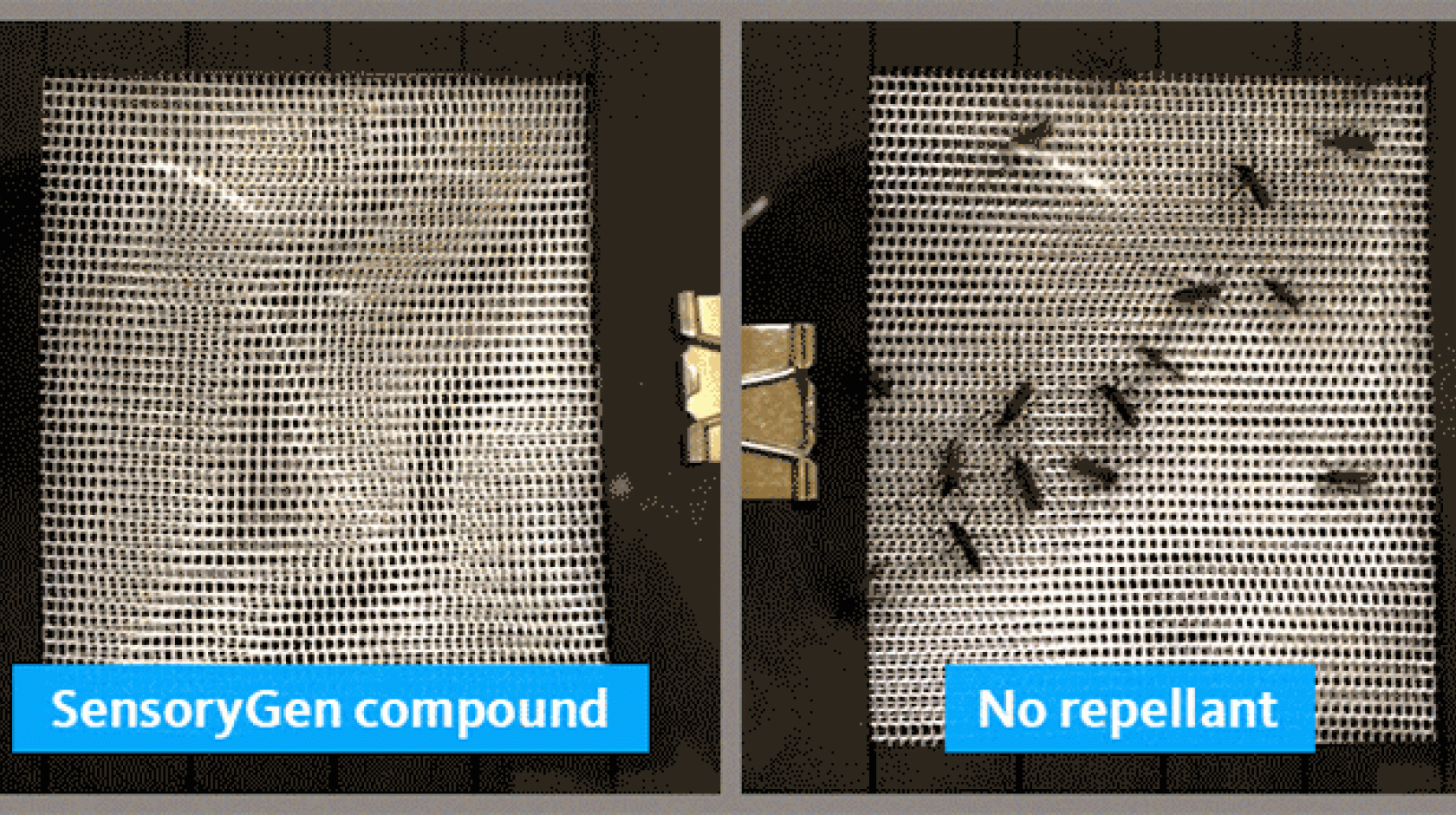News
2020
|
Machine learning reveals potential COVID-19 therapeutic compounds August 13, 2020 — Drug Target Review A drug screen using machine learning has identified hundreds of potential drugs that could be used to treat COVID-19, researchers say. |
UC Riverside Scientists Use AI to Drive COVID Countermeasure Discovery August 12, 2020 — Global Biodefense Researchers at UC Riverside used their machine learning models to screen more than 10 million commercially available small molecules from a database comprised of 200 million chemicals, and identified the best-in-class hits for the 65 human proteins that interact with SARS-CoV-2 proteins. |
|
Scientists identify hundreds of drug candidates to treat COVID-19 August 11, 2020 — UC Riverside UC Riverside researchers used a powerful machine-learning approach to screen millions of chemicals to find suitable candidates |
Using artificial intelligence to smell the roses 
July 28, 2020 — UC Riverside UC Riverside study applies machine learning to olfaction with possible vast applications in flavors and fragrances |
2018
|
Natural mosquito repellent startup wins seed funding December 12, 2018 — UC Riverside If you love the outdoors but hate mosquitoes, there is hope. A natural mosquito repellent that is as effective as stinky, solvent-based formulas is on the horizon. |
2017
|
August 17, 2017 — UC Riverside To reign supreme in a colony, queen ants exude a special scent, or pheromone, on the waxy surface of their body that suppresses ovary development in their sisters, rendering the latter reproductively inactive workers that find food, nurse the young and protect the colony. Now, researchers have begun to unravel the molecular mechanisms behind how ants sense these pheromones and how they control reproduction regulation and other social activities in ant communities. |
Making the ultimate mosquito repellent June 27, 2017 — University of California News ...safer, better-smelling insect repellent is coming, thanks to recent research: completely in the dark before, we know now what a bug’s nose knows. |
2016
|
UC startup lets you smell good to friends, gross to mosquitoes 
May 6, 2016 — University of California News What if, rather than slathering yourself in potentially toxic DEET, you could arm yourself against mosquitoes with an effective, natural repellent that smelled mildly of grape and orange blossom? |
2015
|
New Study Shows Natural Compound Could Replace Insecticides Jun 29, 2015 — Capital Public Radio News Most conventional and organic farmers rely on insecticides to kill pests. But, new research shows that a compound in fruit may be a good natural alternative to repel bugs. |
Safe repellents that protect fruit from spotted wing Drosophila found Jun 22, 2015 — UCR Today (press release) "Toxic insecticides are often risky to use directly on fruits – especially when they are close to being harvested," said Anandasankar Ray, ... |
Fruity alternative to toxic insecticides Jun 22, 2015 — Royal Society of Chemistry Senior author Anandasankar Ray has patented the technology and wants to give farmers the option of using naturally-occurring repellents. |
2014
|
Research Targeting the ACP Olfactory System Shows Promise Oct 30, 2014 — California Ag Today A University of California Riverside Asian citrus psyllid (ACP) research team, led by Anandasankar Ray, associate professor of entomology, has ... |
AGRICULTURE: Early smell of success against citrus psyllid Oct 29, 2014 — Press-Enterprise UCR professor and researcher Anandasankar Ray has been investigating how citrus psyllids smell and what they are attracted to. So far, no ... |
|
California Researchers Find New Tool Against the Asian Citrus Psyllid Oct 27, 2014 — Entomology Today “The ACP olfactory system is sensitive to a variety of odorants released by citrus plants,” said Anandasankar Ray, an associate professor of ... |
Odor molecules monitor pest that spreads devastating citrus disease Oct 27, 2014 — Science Codex ...a research team at the University of California, Riverside has targeted the olfactory system of the psyllid, and identified a suite of odorants – odor molecules – that the ACP olfactory system detects. |
2013
|
How Mosquitoes Hunt Humans [VIDEO] December 7, 2013 — Nature World News Mosquitoes use the same receptors to detect both carbon dioxide as well as skin odors, researchers from the University of California, Riverside report in the journal Cell. |
Why Your Skin Is So Attractive To Mosquitoes December 6, 2013 — Huffington Post According to a new study in the journal Cell, the mosquito's receptors that detect carbon dioxide, which are cells called cap neurons, also detect odors emitted from our skin. |
December 6, 2013 — Health24.com Researchers have learned more about how mosquitoes detect skin odour, and they say their findings could lead to better repellents and traps. |
|
Mosquitoes Are Attracted To The 'Smell' Of Carbon Dioxide Exhaled December 6, 2013 — University Herald Female mosquitoes, which can transmit deadly diseases like malaria and the West Nile Virus, are attracted to potential hosts by "smelling" the carbon dioxide they exhale, according to a recent study. |
Mosquitoes hunt humans by smelling odours December 6, 2013 — Zee News Mosquitoes track down humans from a distance by the smell of carbon dioxide on our breath and then find exposed areas through skin odours, researchers, including an Indian-origin scientist, have found. |
Effective, safe, and pleasant-smelling mosquito control could be on the way December 6, 2013 — New Atlas Foul-smelling, toxic mosquito repellent could soon become a thing of the past |
|
Building A Better Mosquito Repellent, By Blocking Their Ability To Smell Us December 5, 2013 — International Business Times California scientists think they've found a new weapon in the war on mosquitoes: hitting them where they sniff us out. |
Breakthrough Study Shows How Mosquitoes Smell Us, May Lead To Better Repellants December 5, 2013 — RedOrbit |
Look to mosquito smell neurons to find new repellents December 5, 2013 — New Scientist If you hate having to rub noxious chemicals onto your skin to deter mosquitoes, take hope – the next generation of repellents could smell like mint or caramel, and be more effective. |
|
Mosquito Scent-Tracking Discovery Could Lead to Better Repellents December 5, 2013 — Scientific American Human odors and breath trigger the same sensors in mosquitoes, a new study shows |
Scientists Seek to Take Bite Out of Mosquito Problem December 5, 2013 — WebMD Knowing how they detect skin odor might lead to better repellants, researcher says |
October 4, 2013 — Medical News Today Insects are repelled by N,N-diethyl-m-toluamide, also known as DEET. But exactly which olfactory receptors insects use to sense DEET has eluded scientists for long. |
|
Sweet smell of success as scientists unveil repellent October 4, 2013 — Sydney Morning Herald The pungent fumes of insect repellent, an unmistakable smell of Australian summers, may be replaced with the sweet aroma of grapes. |
October 3, 2013 — The Scientist Magazine Identification of a DEET-sensitive olfactory receptor leads to alternative, possibly better, repellants. |
Auf dem Weg zu neuem Mücken-Graus October 3, 2013 — Süddeutsche.de Sanfte Anti-Mücken-Mittel sind rar. US-Wissenschaftler haben nun vier erfolgversprechende Substanzen gefunden. Drei von ihnen sollten verträglich sein: Sie sind bereits als Lebensmittel-Zusatzstoffe zugelassen. |
|
Buzz off! A quest for better insect repellents October 3, 2013 — The Hindu |
Secret of insect repellent discovered October 3, 2013 — IOL Scientists have uncovered the secrets behind the world's most common insect repellent - helping them find new ways to protect people from diseases such as malaria, dengue and West Nile fever. |
Researchers Identify DEET-Detecting Receptors in Insects, Find Natural Substitutes for Chemical October 3, 2013 — Nature World News Researchers at the University of California, Riverside, have discovered receptors in pests that detect DEET, a yellowish oil used in making insect-repellents. |
|
Scientists Uncover DEET Receptors in Insects and Create Repellent Alternatives October 3, 2013 — Science World Report |
October 2, 2013 — Independent Researchers use new screening method to find four repellents that are as powerful as substance used effectively for more than 60 years to protect people |
Scientists Figure Out How DEET Makes Bugs Buzz Off, And How To Make Safer, Cheaper Alternatives October 2, 2013 — International Business Times Scientists think they’ve discovered the secret to how the insect repellent DEET works — and with it, the secret to making a cheaper, safer alternative. |
|
Insect repellent: Scientists find insect DEET receptors, develop safe alternatives to DEET October 2, 2013 — ScienceDaily |
Scientists find insect DEET receptors, develop safe alternatives to DEET October 2, 2013 — Phys.org |
Some grape-scented compounds repel mosquitoes October 2, 2013 — Science News Molecules drive bugs away as well as DEET does |
2011
|
Mosquitoes are suckered in new malaria research June 2, 2011 — Dawn The findings have been tested in a small-scale experiment in Kenya, using huts where alluring plumes of CO2 were released to attract mosquitoes and odour molecules were released to bamboozle them. |
Mosquitoes fooled by compounds that target CO2 sensors June 1, 2011 — Chemistry World New chemicals can fight mosquito-borne diseases by interfering with the insects' carbon dioxide receptors |
|
Smelly chemicals confuse mosquitoes June 1, 2011 — BBC |
Confusing mosquitoes to fight deadly disease June 1, 2011 — LA Times |
Disorienting mosquitoes with a blend of odors June 1, 2011 — arstechnica A combination of odorous chemicals can potentially disorient mosquitoes |
2009
|
Discovery Of Natural Odors Could Help Develop Mosquito Repellents August 27, 2009 — ScienceDaily |
Waiting for Next-Gen Anti-Mosquito Chemicals with Bated Breath August 26, 2009 — Scientific American Novel natural compounds may lead to safe and inexpensive repellents that undercut skeeters' ability to sense their human prey |
|
Combating West Nile Virus and other Tropical Diseases August 24, 2009 — UC Riverside Entomologists at the University of California, Riverside working on fruit flies have discovered a novel class of compounds that could pave the way for developing inexpensive and safe mosquito repellents for combating West Nile virus and other tropical diseases. |
UC Riverside receives $100,000 Grand Challenges Explorations grant May 7, 2009 — EurekAlert! Entomologist Anandasankar Ray will explore long-range olfactory repellents for malaria-transmitting mosquitoes |
2008
|
Olfactory receptor neurons select which odor receptors to express May 27, 2008 — EurekAlert! |
Scientists Discover Genetic Controls For Olfactory Neuron Development In Fruit Fly May 27, 2008 — MedicalNewsToday |
Sniffing Out the Right Address May 27, 2008 — PLoS Biol Synopsis |
